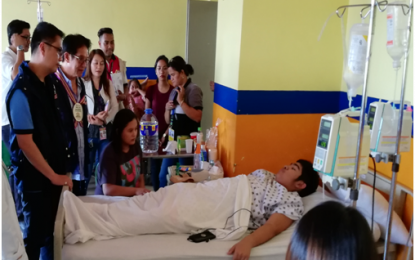
DENGUE. Department of Health (DOH) Undersecretary Enrique Domingo (far left) and Calabarzon Health Regional Director Eduardo Janairo (second left), who heads the DOH National Dengvaxia Task Force, visited a dengue patient confined at the New Sinai MDI Hospital in Sta. Rosa City on July 25, 2019. This was part of the health department’s rounds of visit to dengue-affected localities, some of them in Laguna province. (Photo by Saul E. Pa-a)
CALAMBA CITY, Laguna -- Health Secretary Francisco Duque has appointed Calabarzon Regional Health Director Eduardo Janairo as chair of the National Dengvaxia Task Force to properly address and manage concerns surrounding the effects on the use of the Dengvaxia vaccine.
Janairo said the task force aims to establish a whole-of-government and whole-of-society management team to oversee the implementation of activities for more equitable provision of services for all the regions concerned.
It covers Calabarzon comprising Cavite, Laguna, Batangas, Rizal and Quezon; Central Luzon; and National Capital Region.
“We need to harmonize efforts and provide similar services and activities, support and assistance for the three regions. Basically, what we have done for Calabarzon, we will also implement accordingly in the two other regions,” he said in an interview on Monday.
The Department of Health (DOH) launched in 2016 the Dengvaxia immunization, and was implemented in three regions, including Region 7, on request by the region’s Congressional representative.
But in 2017, the Dengvaxia immunization program had created panic and concerns among parents of the scores of children vaccinees, triggered by the analysis and announcement of its manufacturer.
Janairo bared the task force has monitored that fears and apprehension over the health department’s vaccination program attributed to the Dengvaxia controversy, however, has declined.
“Actually, the Dengvaxia scare was short-lived. They (parents, guardians) now realized there are other more important vaccinations needed as protection for their children,” he said.
He added parents and guardians have gradually eased their misgivings after they were convinced on the importance of the other vaccines as protection for their children from various diseases.
At the height of the Dengvaxia controversy, health authorities uncovered that a total of 833,000 Filipino children were found to have been administered the Dengvaxia vaccine in the regions.
“We need to keep track with the Dengvaxia vaccinees. We are conducting a series of physical examinations, monitor and strengthen their resistance and ensure their health because this is the only way to protect them from any illness or disease which could affect them,” Janairo said in Filipino.
He added the regional health office’s routine visits in various communities during the “Aksyon Barangay Kontra Dengue (ABKD)” underscored the need to track down and monitor the anti-dengue vaccination program.
“Kailangan nating magkaroon ng vaccine and patient tracking kasama na dito ang referral system dahil kailangan natin silang i-profile at bantayan upang malaman kung anuman ang mangyari sa kanila sa loob ng limang taon mula ng sila ay mabakunahan. Lahat ay hahanapin natin at walang dapat maiiwan (we need to have the vaccines and patient-tracking, including the referral system, because we need to profile and monitor them to check on any effect for five years since the time they were vaccinated. We need to find out all of them, and no one should be left behind),” he added.
As head of the DOH Task Force, Janairo assured that the vaccination now is compiling the database and registry of recipients by profiling each child with the registry card, the vaccination and examination records, including periodic physical examinations.
“It is equally important to recommend funding for the purpose of establishing a research agenda for this purpose to find out if there really is a correlation between the Dengvaxia vaccine and the reported deaths allegedly caused by the vaccine,” he said.
While health authorities are still ascertaining the facts and circumstances surrounding the Dengvaxia controvery, Janairo added “as now, wala pa rin talagang makakapagsabi kung mayroon nga itong kinalaman (it is inconclusive if this could be related to the vaccine).” (PNA)
